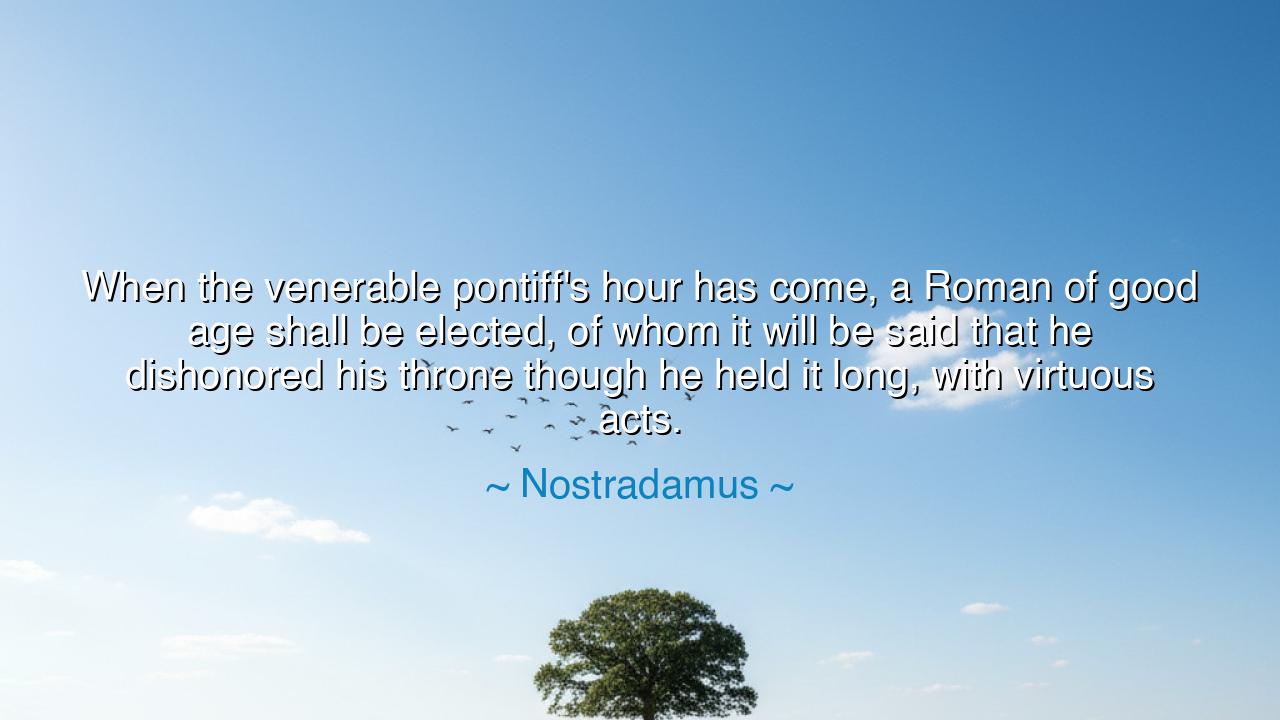
When the venerable pontiff's hour has come, a Roman of good age
When the venerable pontiff's hour has come, a Roman of good age shall be elected, of whom it will be said that he dishonored his throne though he held it long, with virtuous acts.






The prophecy of Nostradamus—“When the venerable pontiff's hour has come, a Roman of good age shall be elected, of whom it will be said that he dishonored his throne though he held it long, with virtuous acts.”—resounds like an echo from the corridors of time, both mysterious and profound. It is a riddle of the soul and of power, a mirror held to those who rule over others in the name of virtue. Within its shadowed phrasing lies a truth that transcends popes and princes alike: that no throne, however sacred, is immune to contradiction, and that honor and dishonor often walk together in the lives of the great. Nostradamus, the seer of Salon, wrote not merely of future events, but of the recurring patterns of human nature—its nobility, its frailty, and its eternal struggle between light and shadow.
When he speaks of the “venerable pontiff’s hour”, he hints at the passing of an age—the death of one order, the rise of another. The “Roman of good age” is a man seasoned by time, wise in appearance, yet burdened by the expectations of holiness. To hold the throne of virtue is to live beneath the world’s gaze, every act weighed against the ideal of purity. Thus, when Nostradamus says that this pontiff “dishonored his throne though he held it long, with virtuous acts,” he speaks to the tragic paradox that surrounds all who seek righteousness: that even virtue itself can become a weapon of judgment, and that the greatest leaders are often both praised and condemned for the same deeds. The throne of faith, like the crown of kings, burns the one who wears it too long.
Throughout history, the prophecy finds its reflection in the lives of men both holy and flawed. Consider Pope Pius XII, whose long reign through the fires of the Second World War remains shrouded in both reverence and reproach. To some, he was a guardian of peace, who protected countless lives through diplomacy and silence; to others, his silence was his sin. Like the man of Nostradamus’s verse, he held his throne long, and though his acts were guided by caution and faith, the world’s judgment split his legacy in two. In this, we see the enduring truth of the prophecy: that virtue, when placed under the weight of power, may appear as both honor and dishonor, depending on the eyes that behold it.
But Nostradamus’s words reach deeper still. They remind us that time tests all reputations, and that the throne—be it of a pontiff, a ruler, or the common heart—cannot escape the erosion of human imperfection. The “dishonor” he speaks of may not be sin, but misunderstanding; not corruption, but the tragic distance between intention and perception. The Roman of his vision, like many leaders before and after, stands as a symbol of the eternal truth that the virtuous life is never free from controversy. For in striving to serve both heaven and earth, a man often offends both.
The ancients knew this duality well. Marcus Aurelius, the philosopher-emperor, ruled Rome with wisdom and restraint, yet even he was accused of weakness for his mercy and of cruelty for his wars. Though his heart sought virtue, the world demanded victory. In the end, history remembered him not for perfection, but for his struggle to be just amid chaos. Like the Roman of Nostradamus’s vision, he was both exalted and burdened by the seat he held. His reign teaches that the noblest acts may be misunderstood, but the noble heart endures nonetheless.
In the tone of prophecy, Nostradamus reminds us that leadership is a crucible: those who serve in righteousness must expect to be scorched by the world’s doubt. To be virtuous while in power is to walk upon a blade, for every act of faith invites suspicion, and every act of mercy may be mistaken for weakness. Yet, as the seer’s words suggest, it is better to hold the throne long with virtuous acts, even if misunderstood, than to seek approval through compromise. The honor of the soul lies not in how others name it, but in how it endures its trials.
Let this teaching be taken to heart, my listener: the world will always misjudge the righteous, but truth, like light, cannot remain hidden forever. When you do good, some will question your motives; when you stand firm, some will call it pride; when you act with mercy, others will deem it folly. Do good anyway. Rule your small kingdom—your life, your home, your conscience—with integrity, and accept that to live virtuously is to live misunderstood. For even if the world calls it dishonor, the heavens know your truth.
And so, as Nostradamus wrote in veiled fire, the prophecy of the “Roman of good age” is not only of a pope, but of every soul that dares to do right in a world that mistakes goodness for weakness. The wise must learn to bear both praise and blame without losing heart. For in the end, as time reveals all, the throne of virtue stands unshaken—not because it is free from fault, but because it endures with faith. And that, above all, is the mark of the eternal: to hold one’s throne long, with virtuous acts, even in the face of a world that cannot yet understand their worth.






AAdministratorAdministrator
Welcome, honored guests. Please leave a comment, we will respond soon